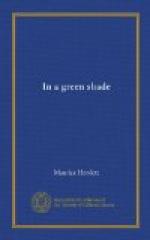It is shocking that a man should live so, held of less account than the sheep which he rears; but it is admirable that this man should live as he does. The house, to call it so, was as clean as a dairy; the children were neat, washed and brushed; the girl was one for Herrick to have sung of. I wish that I could have seen the shepherd, though it may well be that his wife, if she is alive, would reveal more. Something told me that he was a widower, and that this fair young woman mothered his brood for him. What she had of the nest-lore can only have come from a shrewd mistress of it. I did not see a book in the place, nor a newspaper.
Life out there, on such terms, is more solitary than in Northumberland, where the farms are isolated and self-sufficient, but all the hinds’ dwellings are clustered, and society may be had. I don’t believe you can set up for a successful hermit without a long education; and although a shepherd himself may be one by a stern schooling in solitude, you should not expect it of his daughter. Here was a girl made for social amenity, who would want to be danced with, flirted with, courted with flowers, sweets and other delicate observance. She deserved admiration both to receive and impart. It is useless to talk about nature; the love of that is both sophisticated and acquired. Nothing to her the great blue spaces of the Plain, the brooded mystery of Stonehenge, the companionship of her long-dead ancestry, dust in their barrows. No solace for her, after the burden of the day, in the large solemnity of evening out there, which to some of us would call a message almost vocal. To me, for instance, a summer’s dusk, a moonrise on the Plain, are poems without words. Heard melodies are sweet, but those unheard—!
For whom, then, had she adorned herself in white raiment, for whom dressed her dark hair? Not for us, that’s certain. She had had no notice of our coming. That she should do such things for their own sake, elegantia quadam prope divinum, was original virtue in her. Solomon in all his glory had been no goodlier sight; and if she toiled or spun to achieve it, her state, I should say, is by so much the more gracious. And what the devil does she do with herself in the long winter nights, when you light the lamp at four and see nothing of the sun till eight the next morning—and she arrayed like a lily of the field? There’s mending, but you have the afternoon for that; a letter to a brother in Canada; let us hope there’s one to a sweetheart not so far away. And then—what? To-morrow, and to-morrow, and to-morrow.




